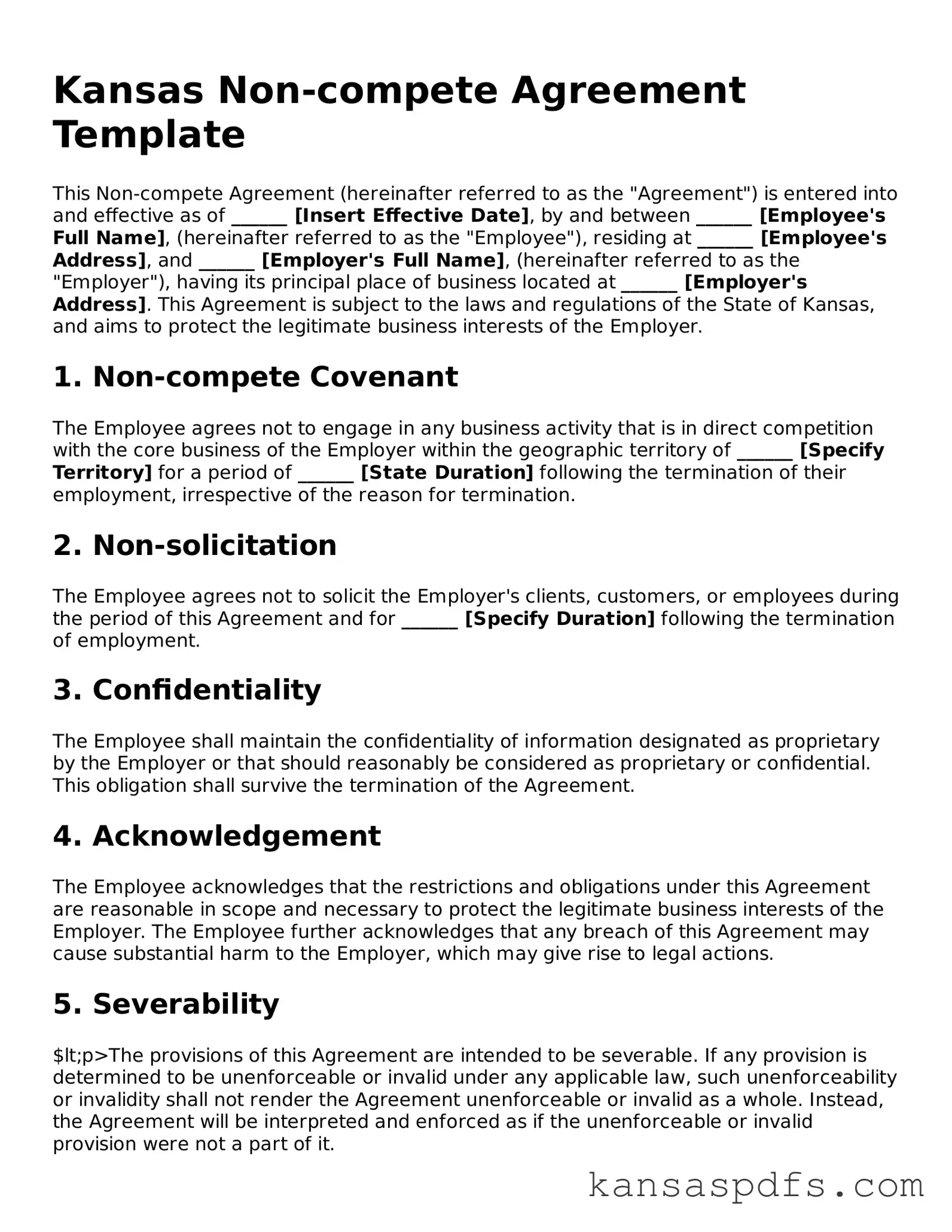What is a Non-compete Agreement in Kansas?
A Non-compete Agreement in Kansas is a legal document that is used to prevent an employee or contractor from entering into competition with an employer after the employment period ends. It can restrict the individual from working with competitors, starting a similar business, or soliciting clients and employees of the former employer within a specific geographical location and time period.
Are Non-compete Agreements enforceable in Kansas?
Yes, Non-compete Agreements are enforceable in Kansas, but they are subject to certain limitations. The agreement must be reasonable in terms of duration, geographical scope, and the type of work restricted. It should protect a legitimate business interest, such as trade secrets or confidential information, without unduly restricting the individual's ability to earn a livelihood.
What makes a Non-compete Agreement reasonable in Kansas?
A Non-compete Agreement in Kansas is considered reasonable if it meets the following criteria: it serves a legitimate business purpose, it does not last longer than is necessary to protect the employer's interest, the geographical limitations are not excessively broad, and it does not impose undue hardship on the employee or conflict with public policy.
Can I refuse to sign a Non-compete Agreement?
Yes, you can refuse to sign a Non-compete Agreement. However, an employer may condition your employment or continued employment on the agreement to sign. Refusing to sign might result in not being hired or potentially losing your current position, depending on the circumstances and the employer's policies.
What should I do before signing a Non-compete Agreement in Kansas?
Before signing a Non-compete Agreement in Kansas, it's crucial to carefully read and understand the terms. Consider consulting with a legal professional to evaluate the agreement's fairness and ensure it doesn't impose unreasonable restrictions on your future employment opportunities. It's also a good idea to negotiate terms if you believe the agreement is overly restrictive.
How long do Non-compete Agreements typically last in Kansas?
The duration of Non-compete Agreements in Kansas can vary, but generally, a period of one to two years is considered reasonable. The specific timeframe will depend on the nature of the industry and the type of information or relationships being protected.
What happens if I break a Non-compete Agreement in Kansas?
If you violate a Non-compete Agreement in Kansas, the former employer may take legal action against you, seeking damages and/or an injunction to prevent you from continuing to breach the agreement. The outcomes can vary depending on the specifics of the agreement and the nature of the violation.
Can a Non-compete Agreement in Kansas be modified or terminated?
Yes, a Non-compete Agreement in Kansas can be modified or terminated, but this typically requires the agreement of both parties involved. In some cases, a court may modify the terms of an agreement if it finds them to be unreasonable or unenforceable as written.
Do Non-compete Agreements apply to all types of employees in Kansas?
No, Non-compete Agreements may not be suitable or enforceable for all types of employees in Kansas. Factors such as the employee's role, access to sensitive information, and ability to impact the employer's business competitively can influence whether an agreement is appropriate.
Where can I get help with a Non-compete Agreement in Kansas?
If you need help understanding, negotiating, or dealing with a Non-compete Agreement in Kansas, consider reaching out to a legal professional experienced in employment law. Legal aid organizations and local bar associations may also offer resources and guidance.

